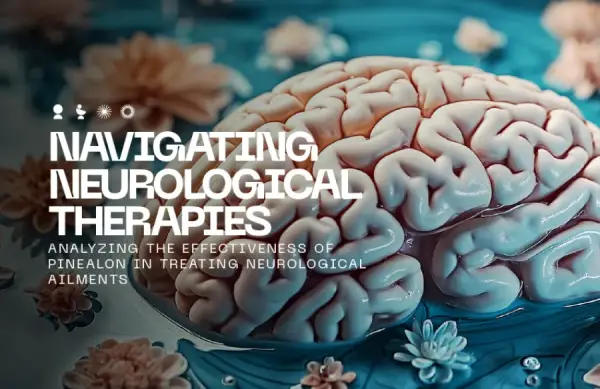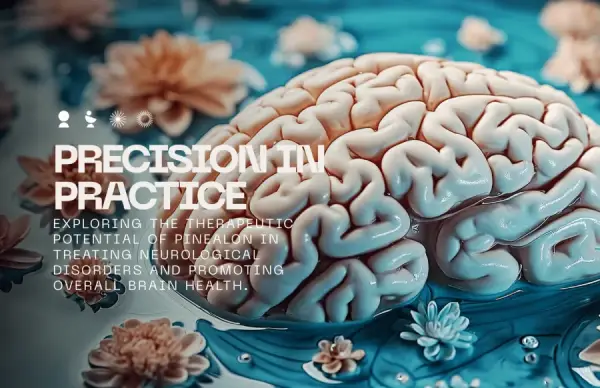Blog
Revolutionary Advances: Pinealon in Neurological Disorders

Contents
What is Pinealon?
The revolutionary potentials of pinealon
Pinealon vs. other treatments for neurological disorders
Pursue better brain health with pinealon from LIVV Natural
Pinealon is a groundbreaking peptide showing immense potential for treating neurological disorders. Modern scientists are exploring its neuroprotective properties and other benefits. It may be the answer for diseases like Parkinson’s, Alzheimer’s, and cognitive decline.
The 3-amino acid tripeptide targets the pineal gland. This tiny brain structure promotes vital functions in the body. It could boost melatonin levels, improve attention, and delay disease progression.
Innovative solutions in cognitive health and neurology are essential for making genuine progress. Could Pinealon be the most significant treatment to enter the market?
Join us as we explore this fascinating peptide. We cover its place in neurology, its wide-ranging benefits, and where to get it.
What is Pinealon?
Pinealon is one of the best peptides for nootropic benefits. It’s making waves among medical communities for its potentially life-changing properties. The most prominent are its neuroprotective applications.
Cortexin is a neuroprotective agent extracted from pig or cow brains. Scientists originally isolated Pinealon from it. They then created the synthetic tripeptide we know today. It comprises three amino acids, known as Glu-Asp-Arg: Glutamine, Asparagine, and Arginine.
Pinealon falls under a class of peptide bioregulators called cytogens. The names of these medications typically come from the organ or tissue they target. The pineal gland is the primary focus in this instance.
Your endocrine system is an essential network of organs and glands. It coordinates with hormones to control vital functions in the body. These include growth, moods, metabolism, injury and stress responses, reproduction, and energy.
The pineal gland plays a crucial role in managing your endocrine system. Some vital functions and processes wouldn’t be possible without it. It sits in the middle of your brain and is roughly the size of a pea, but it has massive importance.
Another function of the pineal gland is its production of melatonin. This hormone responds to light and dark and controls your circadian rhythms. It regulates energy during the daytime and helps you sleep at night.
Melatonin is also a natural, potent antioxidant. It helps protect your body against free radicals, or harmful molecules.
Pinealon could promote these vital processes. It targets the pineal gland, regulates the endocrine system, and produces melatonin. The wonder peptide also has several neuroprotective properties.
The revolutionary potentials of Pinealon
Scientists originally isolated Pinealon to explore its effects on brain health. Studies are looking into its potential for improved cognition, memory, and energy levels.
Pinealon could prevent the accumulation of reactive oxygen species (ROS). These harmful chemicals include free radicals and independent molecules. They negatively impact physiological functions and may cause diseases to develop.
Research shows short peptides like Pinealon can improve brain function. They positively impact the physical working capacity of wrestlers and rhythmic gymnasts. Old rats with hypoxia also benefit from them thanks to increased antioxidative activity.
Pinealon could boost serotonin by synthesizing it through tryptophan hydroxylase-1 (TPH-1). Many consider it to be better than SSRIs and popular SERT modulators. It comes with far fewer side effects while boosting various physiological processes.
Below are nine potential general benefits of Pinealon.
- Improving physical strength
- Regulating sleep cycles
- Maintaining healthy memory
- Relieving joint and muscle pain, inflammation, and post-traumatic brain injury
- Increasing cognitive function and memory recall
- Clearing brain fog and improving learning and attention
- Improving vascular health
- Boosting oxygen and blood flow
- Treating sexual dysfunctions
Pinealon is among the groundbreaking peptides people are touting for anti-aging benefits. It may work in the central nervous system and have anabolic effects on the brain. These actions could slow the rate and symptoms of aging. The benefits depend on biological age indicators.
This tripeptide could also increase the formation of another essential hormone: irisin. It regulates thermogenesis, which plays a role in heat production and energy expenditure.
Irisin could also cause telomere elongation. Telomeres protect chromosome ends from becoming tangled or frayed. They shorten with age, causing oxidative stress and displaying fewer protective functions. Keeping them elongated could promote longevity.
The benefits of Pinealon in neurological health
Neurological disorders stem from dysfunction or affliction to the brain and nervous system. A special class of medical specialists exists to work with, diagnose, and treat them. They’re called neurologists, who are exploring Pinealon’s potential for revolutionary applications.
Over 600 known neurological disorders exist. Below are nine of the most common.
- Spinal cord or brain injury
- Convulsive disorders, like epilepsy
- Defective gene diseases, like Huntington’s disease or muscular dystrophy
- Development issues with the nervous system, like spina bifida
- Neurodegenerative diseases, like Parkinson’s or Alzheimer’s
- Brain tumors
- Diseases affecting blood vessels supplying the brain, like a stroke
- Various infections, like meningitis
- Nerve damage and resulting neuropathy
Peptide therapy with Pinealon may treat attention, memory, and sleep difficulties. Many claim it also helps combat stress, fatigue, insomnia, and depression. Researchers are exploring it to treat multiple sclerosis, Parkinson’s, and Alzheimer’s.
The amino acids in Pinealon integrate with the brain’s DNA structure. This action could restore cell protein synthesis and peptide deficiency. Doctors are exploring it to treat neuralgia, neuritis, and other neuro-infections.
Some neurologists use Pinealon to stimulate the nervous system. It could also boost the flow of oxygen to the brain. Others claim it could help correct central and peripheral nervous system diseases. It may also prevent and treat specific brain disorders.
Rat studies have shown promise for Pinealon in improving learning. It also affected the expression of different NMDA receptor subunits in the hippocampus. Positive results were dose dependent in rodents with experimental diabetes.
Pinealon lowers caspase-3 activity in the brain. Higher levels can cause unwanted neuronal cell death. They reduce survival mechanisms, increase disease risk, and diminish cognitive health. Rat trials have shown positive results, with the peptide boosting the caspase cascade.
Caspase-3 is active in nervous tissues and skin cells. Pinealon’s ability to reduce its function could treat heart attacks and heal wounds. It may also protect the skin from sunburn and regulate blood flow to the heart.
Pinealon may also reduce skin apoptosis (cell death). It boosts the regenerative process and promotes healthy cell growth. The peptide may delay age-related skin diseases. It could also normalize the body’s protective capabilities.
Parkinson’s disease typically affects older adults over 60. It may affect younger individuals, particularly if there’s a genetic predisposition. The progressive disorder impacts specific body parts, including the nervous system.
The primary symptoms of Parkinson’s disease are tremors and slowed movement. Muscles can become stiff and limit range of motion. Slowed or quickened speech or voice changes can occur. Unconscious movements like blinking or smiling may become more challenging.
Pinealon’s improvement of nervous system functions may aid Parkinson’s disease patients. The peptide’s anti-aging potential could also prove beneficial.
Brain-boosting peptides and Pinealon could have a massive impact on neurological disorders. Speak to your neurologist about changing medication and adjusting your routine. Naturopathic approaches may take over among treatment options.
Pinealon research and clinical trials
Pinealon and other peptides are still relatively new in the medical field. Many breakthroughs have occurred, and some controversies exist over specific substances. This tripeptide is one of the most promising. Its benefits for brain health are among its exciting applications.
Several studies have emerged in recent years showcasing Pinealon’s potential. Prenatal rat research shows it protects motor coordination and cognitive function. It guards neurons against oxidative stress and reduces reactive oxygen species.
One study highlighted the neuroprotective effects of tripeptides. It explored the impact on Alzheimer’s disease, listing Pinealon as particularly promising. The paper praised it for possibly preventing dendritic spine elimination and neuroplasticity impairments.
Clinical trials have also shown Pinealon’s effectiveness in treating impaired brain function. It could promote healing after strokes, traumatic head injuries, and surgical interventions. Older adults may also benefit from its ability to boost memory and cognition.
Another review study on Pinealon praises it as a promising neuroprotective agent. It dives into the possible mechanism of gene expression and protein synthesis regulation. It shows positive effects on Alzheimer’s disease, particularly in the early stages.
Further clinical trials come from Peptides in the Epigenetic Control of Aging. Chapter 5 of the book details three human studies using Pinealon. The subjects had brain damage from an internal dysfunction or external trauma.
All three clinical trials produced similar results. The patients reported improved memory, attention, cognition, and motor skills. They also experienced better emotional stability and fewer or less severe headaches.
The efficacy of Pinealon in neurological disorders has proven to be true so far. Neurology is a complex area, so further research could highlight more benefits.
Pinealon typically needs three months or more to display results. Patients should consult with their healthcare providers to determine the ideal treatment. The best administration route is via subcutaneous injections.
Pinealon vs. other treatments for neurological disorders
How does Pinealon compare to other conventional treatments for neurological disorders?
The field of neurology is evolving constantly. Peptides are just one of many possible solutions, but they’re also among the newest. Scientists are also exploring gene therapies for treating Parkinson’s and Alzheimer’s.
Below are four other conventional treatments and how they compare to Pinealon.
- Stem cell research. This approach involves replacing diseased cells with healthy ones. It carries more risks than Pinealon, like immune rejection and tumor formation. It also faces controversy worldwide, and some countries have banned it.
- Rehabilitation. Doctors use therapy to help patients restore some functions after disease or injury. It includes physical, speech, and occupational therapy. It doesn’t involve medications like Pinealon, so it may be safer but less effective overall.
- Natural management. Exercise, psychotherapy, diet, and stress management help maintain neurological health. They’re proven and effective but not as fast-acting or long-lasting as Pinealon.
- Electric brain stimulation. This electrotherapy stimulates the brain to regain essential functions. It happens under strict supervision and may be more effective than common medications. It’s still largely misunderstood and could be riskier than Pinealon.
All of these treatments have proven immense potential in neurological disorders. They remain widely used, and their benefits are undeniable. Pinealon isn’t truly comparable, as it’s merely a different approach. Each option may be more or less effective for unique individuals.
NAD+ IV therapy also shows promising potential in neurological disorders. Its benefits include DNA repair, epigenetic modifications, and pain alleviation. Scientists also view it as a possible Alzheimer’s and Parkinson’s treatment.
Brain mapping, new imaging techniques, and neurogenetics are emerging neurological technologies. They can help doctors and neurologists understand the brain better. More accurate diagnoses and more effective treatments could emerge.
Pursue better brain health with pinealon from LIVV Natural
Pinealon is a synthetic tripeptide derived from cortexin, a neuroprotective agent. Scientists isolated it from pig and cow brains for its cognitive potential. It has since gained increasing attention as a possible treatment for neurological disorders.
This astounding peptide targets the pineal gland and regulates the endocrine system. Multiple physiological improvements follow, including better memory, focus, energy, and cognition.
Rat studies and human trials have proven pinealon’s effectiveness. It has particular potential in treating Parkinson’s and Alzheimer’s disease. Positive outcomes include improved brain health, cell protection and regeneration, and hormone regulation.
Further research is vital for understanding the full impact of Pinealon. Conventional treatments are still undergoing studies, and neurological disorders are complex.
The evolving field of neurology is promising. Emerging technologies and a better understanding of peptides are progressing exponentially. They light the way for more personalized and conventional approaches to neurological disorders.
Speak to your neurologist or trusted doctor to determine if peptides will suit you. Get the purest, highest-quality Pinealon from LIVV Natural if they approve it. Unlock peak brain health and enjoy the vast benefits of peptide therapy today.
Author: Dr. Jason Phan NMD – Founder of LIVV Natural – Anti-aging – regenerative medicine – peptide therapy


